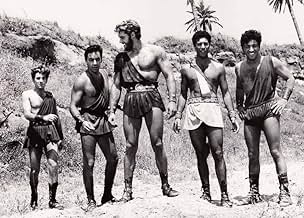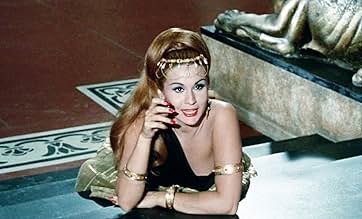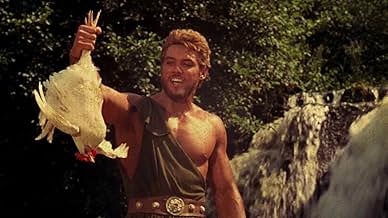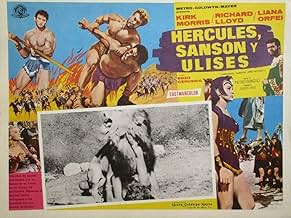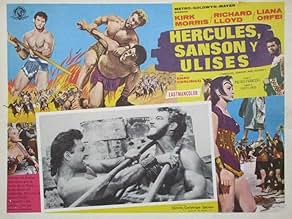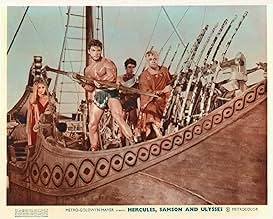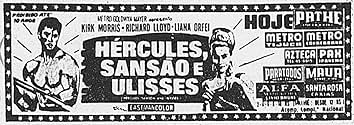NOTE IMDb
4,9/10
716
MA NOTE
Samson and Hercules get herpes from Ulysses, and beat the stuffing out of him!!Samson and Hercules get herpes from Ulysses, and beat the stuffing out of him!!Samson and Hercules get herpes from Ulysses, and beat the stuffing out of him!!
Iloosh Khoshabe
- Samson
- (as Richard Lloyd)
Halina Zalewska
- Lia's Mother
- (as Alina Zalewska)
Histoire
Le saviez-vous
- AnecdotesU.S. fans regard this as the last of the big Italian sword and sandal/muscle-man epics. It was directed by Pietro Francisci, who had started the craze with his Les travaux d'Hercule (1958).
- GaffesSamson lived about 1100 BCE, Ulysses about 1200 BCE, and Hercules about 1250 BCE.
- Citations
Saran of Gaza: No one knows who Samson is. No one has ever seen him. He's been away. I don't know where. But we've heard of his fearful deeds. And we are certain that he exists.
Delilah, Philistine Queen: My lord, Delilah exists too. I'll know how to receive Samson and how to tame him.
- ConnexionsEdited into Cynful Movies: Hercules, Sampson and Ulysses (2022)
Commentaire à la une
Long before DC pit Batman against Superman or Marvel instigated a superhero civil war, writer/director Pietro Francisci imagined a battle between legendary strongmen Hercules (Italian bodybuilder Adriano Bellini, billed as Kirk Morris) and Samson (Iranian actor Iloosh Khoshabe). This being an Italian production, it is somewhat biased in its portrayal of Greek civilization being more -- well, civilized -- than the equally advanced but more tyrannical lands of Judea and Gaza, where Hercules, Ulysses and assorted Greek fishermen find themselves shipwrecked after taking on a sea monster. (The sea monster, by the way, isn't very impressive, but has good sound effects.) The film doesn't really have a developed political or religious agenda, however, despite the benign opening scene in which a bored King Laertes listens to a dispute over a goat between two silly peasants contrasting with the brutal reign of the Philistines, who wantonly murder and burn anyone they consider traitorous. Nor is the fascinating idea of two rival heroes who get their awesome power from entirely different belief systems ever really explored. Though Samson insists his strength comes from his god, the rival concepts of monotheism and polytheism are never mentioned or even implicitly contrasted; in this telling, Hercules had never heard of Samson before getting stranded in the Holy Land, and he never actually mentions Zeus. Everyone is refreshingly blase about religious differences -- when it comes to the Greek interlopers, the main concern of the Philistines and Danites is their odd style of dress.
Women, on the other hand, don't come off as well. Even though Hercules is apparently happily married, his and other wives depicted here are hectoring and disagreeable. The principle villain of the story is Samson's nemesis Delilah, played with lusty gusto by Liana Orfei, consort of the Philistine king who manipulates everyone and tries to seduce Hercules on her way to trying to seduce Samson. She also gets the film's one and only dance number, and makes the most of it. Orfei embraces and relishes playing the baddest girl and is responsible for at least half the fun quotient of the film -- plus, her warrior outfit at the end is not to be missed.
Aside from Orfei's Delilah, the main attraction is the epic battle between Hercules and Samson. Since they are both depicted as righteous heroes, the story has to contrive a situation that pits them against each other without making one of them the bad guy -- the plot involves mistaken identities and erroneous but reasonable assumptions and isn't very important. The fight, against a backdrop of stone ruins that allows for falling styrofoam and various chunks of super-heavy objects the musclemen can hurl at each other, is well-staged and well- executed by Morris and Khoshabe, especially with regard to making them seem evenly matched. Since Samson doesn't really get much action until the climactic battle and Hercules has only some perfunctory fights with a bull and a lion, their fight is basically the centerpiece of the film. What it lacks in spectacle, the actors make up for in enthusiasm.
The English-language version adds Ulysses to the title even though he is, here as in many other Peplum films, a boyishly mischievous sidekick for Hercules. The point here, as the original Italian title ("Ercole sfida Sansone") suggests, is to pit Hercules against Samson, and the film delivers on that promise. It's a nicely shot, very bright and scenic film that makes judicious use of its limited budget and makes for an enjoyable watch.
Women, on the other hand, don't come off as well. Even though Hercules is apparently happily married, his and other wives depicted here are hectoring and disagreeable. The principle villain of the story is Samson's nemesis Delilah, played with lusty gusto by Liana Orfei, consort of the Philistine king who manipulates everyone and tries to seduce Hercules on her way to trying to seduce Samson. She also gets the film's one and only dance number, and makes the most of it. Orfei embraces and relishes playing the baddest girl and is responsible for at least half the fun quotient of the film -- plus, her warrior outfit at the end is not to be missed.
Aside from Orfei's Delilah, the main attraction is the epic battle between Hercules and Samson. Since they are both depicted as righteous heroes, the story has to contrive a situation that pits them against each other without making one of them the bad guy -- the plot involves mistaken identities and erroneous but reasonable assumptions and isn't very important. The fight, against a backdrop of stone ruins that allows for falling styrofoam and various chunks of super-heavy objects the musclemen can hurl at each other, is well-staged and well- executed by Morris and Khoshabe, especially with regard to making them seem evenly matched. Since Samson doesn't really get much action until the climactic battle and Hercules has only some perfunctory fights with a bull and a lion, their fight is basically the centerpiece of the film. What it lacks in spectacle, the actors make up for in enthusiasm.
The English-language version adds Ulysses to the title even though he is, here as in many other Peplum films, a boyishly mischievous sidekick for Hercules. The point here, as the original Italian title ("Ercole sfida Sansone") suggests, is to pit Hercules against Samson, and the film delivers on that promise. It's a nicely shot, very bright and scenic film that makes judicious use of its limited budget and makes for an enjoyable watch.
- michael-3204
- 14 sept. 2016
- Permalien
Meilleurs choix
Connectez-vous pour évaluer et suivre la liste de favoris afin de recevoir des recommandations personnalisées
- How long is Hercules, Samson & Ulysses?Alimenté par Alexa
Détails
- Date de sortie
- Pays d’origine
- Langues
- Aussi connu sous le nom de
- Hercules, Samson & Ulysses
- Société de production
- Voir plus de crédits d'entreprise sur IMDbPro
- Durée1 heure 33 minutes
- Rapport de forme
- 1.85 : 1
Contribuer à cette page
Suggérer une modification ou ajouter du contenu manquant

Lacune principale
By what name was Hercule, Samson et Ulysse (1963) officially released in India in English?
Répondre
